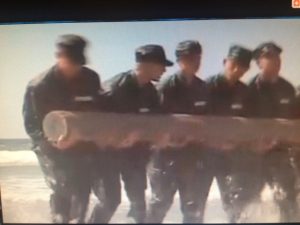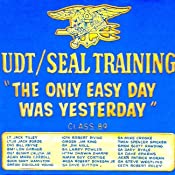There’s something truly magnetic about Navy SEALs, isn’t there? They represent the peak of human performance, operating under unbelievable pressure. You’ve probably seen movies or read books and felt a mix of awe and maybe even intimidation.But what if I told you their world offers powerful insights for your own life? We’re exploring incredible Life Lessons From Navy SEALs you can use every single day. These lessons offer a starting point for personal growth.
These aren’t just battle tactics; they’re strategies for facing challenges, building mental strength, and achieving goals, whether you’re in the military, a veteran, or just aiming to improve yourself. These adaptable Life Lessons From Navy SEALs can help you become more resilient and capable, transforming your life experience.

Life Lessons Of Navy SEAL Frogmen You Must Know For Success
Table of Contents:
- Why We Look Up To Navy SEALs
- Embracing the Suck: Finding Strength in Adversity
- The Power of Teamwork: It Takes a Village (or a Platoon)
- Essential Life Lessons From Navy SEALs on Leadership
- Discipline Equals Freedom: The Paradox Explained
- Mental Toughness: Winning the Battle Within
- Planning and Preparation: Failing to Plan is Planning to Fail
- Adaptability: The Only Constant is Change
- Simplicity: Keep It Simple, Stupid (KISS)
- Conclusion
Why We Look Up To Navy SEALs
Becoming a Navy SEAL is famously difficult. Their selection and training process, known as Basic Underwater Demolition/SEAL (BUD/S), is one of the toughest military programs anywhere. Candidates undertake basic seal training designed to push them beyond perceived limits.
This intense program involves multiple physical and mental challenges. Think freezing cold swims in the Pacific, grueling obstacle courses, long swims, and constant physical training under extreme stress. The infamous Hell Week, five and a half days of continuous training with minimal sleep, tests candidates to their absolute core.
This demanding process builds extraordinary individuals known for their grit and ability to succeed when everything is on the line. Their reputation for getting the job done under extreme conditions is legendary, forged through relentless training days. Think about that level of commitment required just to get through one day training.
But the tactical skills and physical power honed aren’t solely for combat scenarios. They are fundamental principles for overcoming obstacles and living a purposeful life. That’s why so many people are interested in what they can learn from these elite warriors and their unique life filled approach.
Embracing the Suck: Finding Strength in Adversity
You might hear SEALs talk about “embracing the suck.” What does that really mean? It’s about accepting that hardship, discomfort, and pain are often unavoidable parts of achieving something meaningful, especially during seal training.
A classic example from BUD/S is the “sugar cookie” punishment. Students ordered into the cold surf fully clothed then have to roll around on the beach until covered head-to-toe in sand. They spend the rest of the day cold, wet, and sandy, learning to operate effectively despite discomfort.
Instead of complaining or quitting when things get tough, they lean into the difficulty, even when facing the mud flats or freezing cold water. They understand that pushing through adversity is how you build real mental and physical toughness. This mindset transforms challenges from something to dread into opportunities for growth; it shows you canât change the circumstances, only your reaction.
How does this apply to you? Maybe it’s tackling a demanding project at work, pushing through a challenging workout, or facing personal setbacks during your darkest moment. Learning to accept and even welcome the struggle, as SEALs do, builds incredible resilience that serves you everywhere when you pursue goals.
The Power of Teamwork: It Takes a Village (or a Platoon)
Teamwork isn’t just encouraged among Navy SEALs; it’s essential for survival and success. Missions are complex and dangerous, requiring absolute trust and coordination among team members using their combined tactical skills. The idea of the lone wolf just doesn’t work here; the destination takes friends.
They practice concepts like “covering your buddy’s six,” meaning always looking out for your teammates’ backs. During BUD/S, trainees quickly learn the importance of teamwork during evolutions like carrying the heavy rubber boat (log PT). Failure by one often means punishment for all, reinforcing interdependence.
Every member knows their role and relies heavily on others doing theirs effectively, from the point man to the strong coxswain guiding the boat. Success is a team effort, and failure often has severe consequences, reinforcing this dependence. Admiral William McRaven highlighted this in his commencement speech, noting you can’t paddle the boat alone.
This emphasis on collaboration holds powerful lessons for civilian life. Whether in a business team, a community group, or your own family, fostering trust, clear communication, and mutual support creates a stronger, more effective unit. True strength often comes from unity, understanding that it takes friends to reach the destination.
Essential Life Lessons From Navy SEALs on Leadership
SEAL teams showcase dynamic and highly effective leadership models. It’s not about barking orders from behind a desk. It’s about shared purpose and responsibility, practiced daily.
Leading From the Front
SEAL leaders are expected to lead by example. They don’t ask their team to do anything they aren’t willing to do themselves, like enduring cold swims or difficult physical training. They often share the same risks and hardships.
This builds respect and trust throughout the training class and beyond. When leaders demonstrate competence and commitment under pressure, it inspires the entire team to perform at their best. It shows they are truly in it together, whether facing obstacle courses or complex missions.
Extreme Ownership
Retired Navy SEAL officer Jocko Willink popularized the concept of Extreme Ownership. It’s a simple yet profound idea: leaders must take full responsibility for everything that happens under their watch. No excuses, no blaming others, regardless of social status or background.
If a mission fails, or even if a small part like a uniform inspection detail goes wrong, the leader owns it. This doesn’t mean they shoulder all the blame unfairly; many students didnât understand this at first. It means they accept responsibility for figuring out what went wrong and how to fix it moving forward, something many couldnât accept initially.
Adopting this mindset in your own life is incredibly empowering. When you stop blaming external factors and take ownership, you gain control over finding solutions and making improvements. It applies to your job, your relationships, and your personal goals, fostering a small sense of control even in chaos.
Decentralized Command
SEAL teams operate using decentralized command. This means junior members are empowered to make critical decisions on the ground without constantly seeking approval from higher-ups. Everyone understands the mission’s overall intent, learned through rigorous navy seal training.
This approach fosters initiative, adaptability, and speed. Team members closest to the situation, perhaps facing an unexpected challenge like a rope perilously fast becoming unstable, can react quickly. Trust is placed in their training and judgment, honed during basic seal training.
Think about how this could improve efficiency in a business setting or even within a family. Empowering responsible individuals to take action often leads to better outcomes than rigid, top-down control. It applies equally regardless of ethnic background or religious background.
Discipline Equals Freedom: The Paradox Explained
Here’s another powerful idea, also strongly associated with Jocko Willink: Discipline Equals Freedom. It sounds contradictory at first, right? How can strict discipline lead to more freedom?
The concept is that by cultivating discipline in key areas of your life – fitness, work ethic, finances, learning – you actually create more choices and opportunities for yourself. Discipline builds capability and control, essential traits for Navy SEALs. It’s easy to be undisciplined, but it limits you.
Think about physical fitness. The discipline to exercise regularly gives you the freedom to be more active, have more energy, and potentially live a longer, healthier life. Financial discipline gives you the freedom from debt and the ability to pursue opportunities, avoiding a life filled with monetary stress.
Lack of discipline often leads to fewer options and feeling trapped. For a SEAL, lack of discipline in training or preparation could have fatal consequences. For us, it might mean missed opportunities or unrealized potential.

Mental Toughness: Winning the Battle Within
Perhaps one of the most admired qualities of Navy SEALs is their incredible mental toughness. BUD/S is designed not just to test physical limits, but to break down mental barriers. How do they build such resilience during BUD/S?
SEALs use several techniques learned during intense Navy SEAL training. Visualization helps them mentally rehearse missions and overcome challenges before they happen. Goal setting is critical, often breaking down huge objectives into smaller, manageable steps and focusing on completing the next task.
Positive self-talk and controlling their internal dialogue helps them stay focused and push through pain and doubt. A common refrain might be internal: donât ring the bell. That brass bell symbolizes quitting BUD/S; choosing not to ring it, no matter the pain, is a monumental act of will.
There’s also the famous “40% Rule,” a concept discussed by former SEAL David Goggins. He suggests that when your mind tells you you’re completely tapped out, you’re often only at about 40% of your true capability. Learning to push past that mental barrier unlocks hidden reserves, a key lesson from Navy SEAL training.
Another technique involves finding moments of levity, even in the midst of misery. Admiral William McRaven shared in his commencement speech how one student started singing when the class was up to their necks in freezing mud during Hell Week. This seemingly foolish act lifted the spirits of the entire bud/s class and helped them endure; sometimes you need to start singing when you’re up to your neck in mud.
Building mental fortitude takes practice, just like physical training. It involves confronting discomfort, controlling your thoughts, and understanding that your perceived limits are often self-imposed. It’s never an easy day, but that mindset makes challenges manageable.
| SEAL Mental Toughness Technique | Description | Civilian Application |
|---|---|---|
| Visualization | Mentally rehearsing scenarios and desired outcomes. | Practicing a presentation or difficult conversation in your mind. |
| Goal Setting (Segmentation) | Breaking large, overwhelming tasks into small, immediate steps. | Focusing on completing one part of a large project instead of the whole thing. |
| Positive Self-Talk | Consciously directing internal dialogue towards encouragement and resilience. | Replacing thoughts like “I can’t do this” with “I can handle the next step”. |
| The 40% Rule | Recognizing that mental fatigue often precedes true physical exhaustion. | Pushing slightly beyond your comfort zone during exercise or challenging tasks. |
| Finding Positivity (Start Singing) | Seeking moments of hope or humor even in difficult situations. | Maintaining perspective and finding small positives during personal challenges. |
| Never Quit (Don’t Ring the Bell) | Committing fully to a goal and refusing to give up when faced with hardship. | Persevering through job searches, educational programs, or personal improvement goals. |
Planning and Preparation: Failing to Plan is Planning to Fail
Success in high-stakes operations relies heavily on detailed planning and preparation. SEALs spend countless hours analyzing intelligence, developing plans, and rehearsing scenarios. They leave as little to chance as possible, understanding that preparation is a great equalizer.
A key part of their planning involves contingencies. They ask “What if?” constantly. What if the primary plan fails? What if conditions change, like encountering unexpected resistance or equipment failure?
They develop backup plans (and backups for the backups) to ensure they can adapt and still achieve the mission objective. This rigorous planning covers everything from routes and timing to communication protocols and emergency procedures. Even small details, like a perfect uniform inspection, reflect this commitment to preparedness.
This level of preparedness drastically reduces fear and uncertainty. You can apply this by thoroughly preparing for important presentations, job interviews, or significant life events. Anticipating potential problems and having solutions ready builds confidence and increases your chances of success, making sure each task is completed correctly.
Adaptability: The Only Constant is Change
No plan survives contact with the enemy, as the saying goes. SEALs operate in dynamic, unpredictable environments where things rarely go exactly as planned. Their ability to adapt quickly is crucial for survival and mission success.
They need to assess changing situations rapidly, adjust their tactics, and make sound decisions under pressure. Imagine a student decided to slide down a rope perilously fast during training, potentially causing injury; the instructors and other students must adapt instantly. Rigidity can be fatal when bravely mounted obstacles shift unexpectedly.
They embrace flexibility and problem-solving on the fly. This adaptability is drilled into them during training, where instructors constantly change scenarios to force students didnât understand previously to think on their feet. Whether facing freezing cold swims that are longer than briefed or an obstacle head-first approach being blocked, adaptation is mandatory.
Careers change, relationships evolve, and unexpected challenges arise, like those faced by Larry Fowler in his Dare To Live Greatly book or Doug Young in their careers.
It allows you to pivot and find new paths forward when circumstances shift. Adaptation is key. Situation dictates. You can’t always control the starting point, but adaptability helps you reach the destination.
Simplicity: Keep It Simple, Stupid (KISS)
You might think elite operators use overly complex strategies and gear. Often, the opposite is true. Navy SEALs value simplicity, a core life lesson learned in the harsh environment of BUD/S.
The KISS principle (Keep It Simple, Stupid) is highly relevant in their world. Complex plans have more potential failure points, especially under stress. Complicated equipment can malfunction more easily in harsh conditions like cold water or sandy environments.
Simple, clear plans and reliable gear are preferred because they are more robust under pressure. Communication needs to be concise and unambiguous. Tasks completed efficiently often rely on straightforward methods.
Think about how you can apply this. Are your goals overly complicated? Is your communication clear and direct? Simplifying your approach to problems, tasks, and even how you organize your life â can often lead to more clarity and effectiveness, reducing the chance something goes wrong.
Conclusion
The world of Navy SEALs offers a deep well of inspiration and practical wisdom. Their commitment, resilience, and effectiveness stem from core principles that anyone can learn from and apply to their own life experience. These aren’t secrets reserved for an elite few; they are powerful approaches to handling life’s challenges.
By embracing discomfort (“the suck”), working effectively with others because the destination takes friends, leading with responsibility (Extreme Ownership), cultivating discipline, building mental toughness so you don’t ring the bell, planning diligently, adapting to change, and valuing simplicity, you tap into potent Life Lessons From Navy SEALs. Think about which lesson, perhaps inspired by Admiral William McRaven’s commencement speech or the sheer grit shown during Hell Week, resonates most with you today.
Applying even one of these principles can make a noticeable difference in how you face obstacles and pursue goals. Remember the powerful Life Lessons From Navy SEALs the next time you face a tough situation or your darkest moment. You might surprise yourself with what you’re capable of achieving when you adopt the mindset that yesterday was the only easy day.
